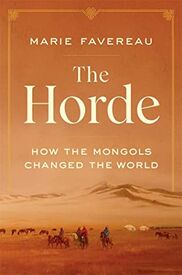The Horde

How the Mongols Changed the World
by Marie Favereau
Completed: August 17, 2021- History
- 377 pages
- ISBN: 9780674244214
- Goodreads page
If you are particularly interested in the Jochi Horde of the Mongol empire, then this is the book for you. If you are interested in the Mongols more generally, then you might want to start elsewhere (including just the relevant chapters from something like the Penguin History of the World). That said, you might still want to read the first 2 chapters of this book & skim the rest & read the Epilogue.
One of the main theses of this book is that the administrative and state-building capacity of the Mongol Empire is often ignored, under the false belief that nomads weren’t administratively sophisticated and either couldn’t or were not interesting in state building. This book goes to show that this is not the case, and that the evolution of the Mongols has had a profound impact on most of Europe and Asia (and not just for the ‘conquest’ reasons typically given).
Couple of excerpts:
…[N]omads were expert administrators who did not need to rely on their sedentary subjects to forge an empire, because the nomads possessed governing institutions of their own - institutions that persisted in modified forms long after the Mongol Empire and the Horde dissipated.
It seemed impossibly simplistic that the Mongols were motivated by an unalloyed desire for conquest. In fact, Chinggis Khan had no grand design to conquer the world. Furthermore, it was never his goal to attack and loot cities but rather to submit the steppe nomads. The presumed rapine of Mongol conquest also had to be contested, because the available evidence shows that Chinggis was not a mass murderer. Instead, he assimilated dominated people into his Mongols. What mattered to Chinggis was to subjugate the Felt-Walled Tents, the nomadic peoples of East Asia.
…
The conquests of China, Iran, and Russia were side effects of an nomad-on-nomad war in which sedentary neighbors had interfered.
From these side effects emerge fascinating and novel interpretations of history. For one thing, nomadism is not necessarily resistant to state-building; in the case of the Jochids, the opposite is true: nomads built a complex and durable empire precisely in order to accomplish the goals inherent in their political theory. The Mongols wanted a regime that - analogous with their own communities and kinship groups - could absorb and harmonize everything social. But in the process of growing, they found themselves butting up against resistant populations. Rejecting the Mongols’ all-embracing attitude toward religion, the military, work, and family, rebels arose against conscription and the Mongol labor and taxation regimes. This is a historical constant: every state-making project has its twin, the population that resists state power.
The Mongols did not settle and did not become like their subjects; on the contrary, they absorbed foreign cultures into their own. The Mongols’ power was mostly based on their ability to synthesize diversity. For the Jochids in particular, cultural change was not a one-way phenomenon. They did not become Slavs or Islamic-style rulers, even as they adopted Slavic peoples and Islamic principles. Nor did Jochid subjects necessarily become indistinguishable from Mongols, even though the Horde profoundly changed the peoples it dominated. The Jochids reinvented themselves without losing themselves.
One lesson, then, is that pastoralism is not a primitive stage on the path to modernization. Pastoralism is a different choice, one that enabled the Jochids to fashion a unique imperial entity that mimicked no sedentary model. It is not by chance that the Jochid style of rule outlived the Horde in much of its former territory.
The Horde shaped the politics of Russia and of Central Asia and firmly anchored Islam in the Caucacus and Eastern Europe.
There was as much a Jochid way of empire as there was a Roman way, an Ottoman way, and a British way. When we think about the legacy of empires, we of course recognize the cosmopolitan effects of the Mediterranean, European, and Ottoman powers that made the world smaller through practices of tolerance, coercion, exploitation, protection, investment, and conquest. These empires are credited with driving global history. But nomads drove global history, too, and none more so than the people of the Horde.
All book cover images are from Goodreads unless specified otherwise.